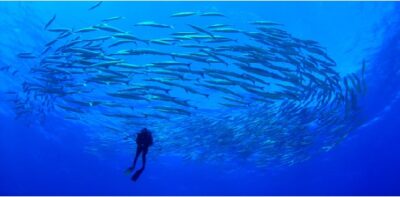If you haven’t seen the documentary InnSaei: The Power of Intuition, give it a watch. When 29-year-old Icelander Hrund Gunnsteinsdóttir burned out on her job at the United Nations, she resigned. Then she went exploring to find out what went wrong.
Talking to professors, healers, artists, elders, shamans and a deep-sea diving ecologist, she learns about innsaei. It’s the Icelandic word for the sea within. Also, to see within—to know yourself. And to see from the inside out—intuition. But how does that explain her burnout?

Source: Zeitgeist Films
After dealing with the horrors of the war in Rwanda and other atrocities, Gunnsteinsdóttir didn’t know she was experiencing what so many in the helping professions experience, a disconnection from her emotions. (See my essay The Human Cost of Taking Care.) Under traumatic stress, the logical mind takes over and blocks out everything else to help people keep going. In the short-term, that can be useful. But long-term, being centered solely in reason not only denies or distorts emotion, it blunts our sensory receptors and cuts off intuition too. We’re only fully human when we’re in touch with all of these ways of knowing.
Ideas from InnSaei I Resonate To
Harvard University business professor Bill George says the highest level of decisions is intuitive. If that wasn’t true, we’d just turn on the computers and have all the answers. With the dominance of rational thought, we’ve become lost in the numbers and logic. It’s taken away our capacity to advance intuitive skills. We need to let our intuition flow.
Psychiatrist and author Iain McGilchrist says people experience the world as a heap of fragments and it’s hard to see how they cohere and what they mean. The left brain doesn’t make these connections.
George adds: We need the detailed execution of the rational mind, the left brain. We also need the broad view of the world, the meaning and interpretation that comes from the right brain, our intuitive side. The analytical and intuitive are complementary. We need to be able to put disparate thoughts and information together into some kind of integrative whole. The problems we have today are intractable because we haven’t brought ideas together from different disciplines. We just keep doing the same thing and get the same results.
Shaman Marti Speigelman thinks modern people aren’t in touch with intuition, yet it’s one of the ways we know things. We’ve forgotten how to be aware of all of our sensory data—the five senses and more—that are constantly scanning the many dimensions of life. We’re designed to take in many views of the world at the same time, without confusion.
We can intuit from nature, by being in the natural world. But modern people are so constantly bombarded with information and distractions, it’s hard for them to experience the natural world, to sit with it for five minutes without thinking, with all their senses open.
McGilchrist: Intuitive awareness lies outside of our focus of attention. Most of our mental processes aren’t conscious.
West African Elder and author Malidoma Patrice Somé says nature speaks in all kinds of languages. Without nature, we cannot revive our intuition.
Noise is blocking our connection to the world. It’s mitigating the sound of the internal world. Give trust to the power of intuition and allow intuition to be the platform to connect our past, present and future.
George: Intuition is the missing link between our inner and outer world
How People & Our World Benefit from InnSaei
Speigelman: Over many generations, the Polynesians mapped most of their ocean world without instruments, just by listening to the sea, immersing themselves in its rhythms.
Ecologist and diver Enric Sala explored parts of the ocean where humans haven’t been. He said experiencing first-hand that solitude and new territory helped him develop his intuition. It was his intuition that let him see what’s wrong with the ocean today and how to bring it back.
McGilchrist: Intuitive information is implicit and subtle. He gives an example of meeting someone who seems friendly, but something seems a little bit wrong. You can’t quite put your finger on it. It’s intuition that’s in touch with that kind of information.
Somé: Knowing what we’re feeling and what others are feeling
Speigelman: Use intuition to make the wisest decisions we can, not just the smartest.
Practices to Improve Intuition & Sensory Awareness
Speigelman: Do tiny exercises throughout the day that teach you and bring you to your sensory awareness. Between your front door and your car, notice all that’s around you. When you stop at a traffic light, open all your senses for a moment. See what you take in.
Somé: Let nature revive you and speak to you.
Artist Marina Abramović: Going to the unknown is rule number 1. Give every last ounce of everything you have to something. Then you have to let it go. The moment when you’re not expecting it is when the answer comes. Potential failure is part of the journey. You don’t know what will happen.
George: Use mindfulness practices so the trivial things wash away.
For me, mortality contemplation, or just resting for a few moments in the awareness that I will die washes away the trivial and makes what’s most important sparkle. Sensory immersion in the natural world too, even from my window.
The InnSaei Documentary
If intuition and sensory awareness as ways of knowing interest you, watch the documentary. You won’t be disappointed.
